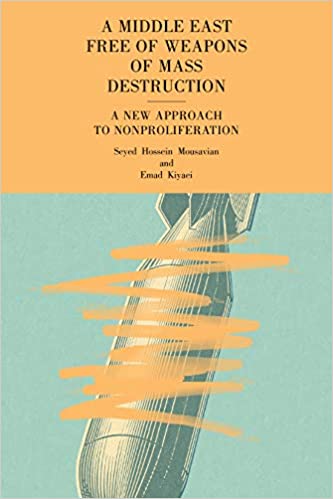New book explores the concept of creating a Middle East zone free of weapons of mass destruction
Israeli Prime Minister Benjamin Netanyahu, speaking in Tel Aviv in 2018, claims to have proof of a "secret" Iranian nuclear weapons programme (AFP)
In A Middle East Free of Weapons of Mass Destruction: A New Approach to Non-Proliferation, Seyed Hossein Mousavian and Emad Kiyaei offer a well-informed and thoughtful take on "new ways of reviving the call for the establishment of a WMD-free zone in the Middle East".
The idea of a Middle East zone free of weapons of mass destruction has been around since 1990, and has featured prominently on the agenda of each review conference of the nuclear non-proliferation treaty (NPT). Such a zone would bring the Middle East into line with Latin America, Africa, Southeast Asia, the Pacific and Central Asia. All have created zones free of nuclear weapons, effective sources of peer pressure to respect a common interest.
Holistic approach
The idea needs reviving, because the US and Israel have long stymied all attempts at progress towards a Middle East zone. Israel is one of several UN member states never to have been a party to the NPT. It is thought to have manufactured dozens of nuclear warheads, and has shown no inclination to dismantle them.
The "new way" that the authors favour is a holistic one. They see a Middle East zone as a prize lying at the end of the progressive resolution - or, at least, attenuation - of the many resentments, sources of mistrust, rivalries, animosities and threat perceptions that have made the Middle East the least stable global region in recent decades.
It is almost impossible to imagine Israel destroying its nuclear, chemical and biological weapons as long as the Middle East remains beset by severe tensions and conflict
A significant part of this illuminating book describes the roots of the current instability in the region, with accounts that are both historical and analytical in regard to Iran's uneasy relations with several of its Arab neighbours, Iran's and Israel's nuclear programmes, the 2015 nuclear deal, the use of chemical weapons in Syria, and the emergence of a risk that terrorists will acquire WMD.
The authors are surely right to advocate a holistic approach. It is almost impossible to imagine Israel destroying its nuclear, chemical and biological weapons as long as the Middle East remains beset by severe tensions and conflict.
Security cooperation
It would have been interesting if the authors had analysed the pros and cons of an alternative to the step-by-step approach to stabilising the Middle East that they also advocate: conference diplomacy. A historical model relevant here is the Conference on Security and Cooperation in Europe (CSCE).
In 1975, the CSCE produced the Helsinki Final Act, which contributed to the conclusion 15 years later of the Treaty on Conventional Armed Forces in Europe and the end of the Cold War. It also led to the creation of a permanent institution, the Organization for Security and Cooperation in Europe.
An organisation for security and cooperation in the Middle East would address another of the region's particularities: it lacks an institution akin to the Organization of American States, the African Union, or the Association of Southeast Asian Nations.
Of course, the authors may have considered such an option and dismissed it as unrealistic. They are well aware of the importance of cooperative security arrangements as a significant stepping stone on the path to a WMD-free zone. They preferred instead to explore the idea of a sub-regional option: a Persian Gulf Arrangement for Security and Cooperation.
Whether a regional approach to security-building would be feasible depends in part on the attitude of outside powers. It would require the US, Russia, China and Europe to perceive reasons for promoting it and to be ready, at a later stage, to offer security guarantees. It would also require Iran and Israel to be open to talks, a factor that has long been absent.
Grim consequences
Another interesting idea that the authors explore is a region-wide religious prohibition on the possession and use of WMD. This has its roots in the fatwa that Iran's Supreme Leader issued against nuclear weapons. There has been a tendency in the West to regard that fatwa as window dressing, amid evidence that Iran researched nuclear weapon design and manufacture prior to 2004. The authors take a different view, and it merits attention.
This is a book rich in ideas. Since both of its authors know the Middle East from the inside, and one has practised diplomacy at the highest level within the region, their ideas are valuable. Freeing the Middle East of WMD appears at present to be "a monumental task," they note - but setting about it by addressing sources of insecurity makes good sense. The authors also remind us that the consequences of inaction could be grim. Saudi Prince Turki al-Faisal once remarked that if all efforts failed to convince Israel to shed its weapons of mass destruction and to prevent Iran from obtaining similar weapons, then Saudi Arabia must look into all options, including obtaining such weapons.



No comments:
Post a Comment